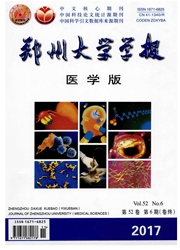

 中文摘要:
中文摘要:
目的:评价食管癌患者外周血恶性黑色素瘤相关抗原(melanoma-associated antigen,MAGE)-C2抗原特异性CD8^+ T细胞的功能,并分析其与临床病理参数的相关性。方法:密度梯度离心法获取130例食管癌初治患者(收集自2014年11月至2015年11月郑州大学第一附属医院胸外科)的PBMC,流式细胞术、RT-PCR方法筛选HLA-A2*0201和MAGE-C2共阳性的患者,其PBMC培养7、14 d后加MAGE-C2(336-344)抗原肽1μg/ml、IL-2 100μg/ml和CD3/CD28 Dynabeads 2μl处理,诱导扩增抗原特异性CD8^+ T细胞,流式细胞术检测CD8^+ T细胞表面CD107a和胞内IFN-γ的水平,并分析其与临床参数的相关性。结果:筛选出52例HLA-A2*0201和MAGE-C2共阳性的患者,MAGE-C2(336-344)处理其PBMC后,MAGE-C2(336-344)处理组CD8^+ T细胞中CD107a^+IFN-γ^+,CD107a^+IFN-γ^-和CD107a^-IFN-γ^+细胞的比例明显升高(P〈0.05);CD107a的表达在早期、未发生淋巴结转移和高分化的食管癌患者明显高于晚期、发生淋巴结转移和低分化的癌症患者(P〈0.05);IFN-γ的表达在高分化的食管癌患者明显高于低分化的食管癌患者(P〈0.05)。结论:成功诱导扩增MAGE-C2抗原特异性CD8^+ T细胞,并发现其功能与食管癌的分期和淋巴结转移相关,似可作为一种理想的免疫治疗靶点。
 英文摘要:
英文摘要:
Objective: To evaluate the function of melanoma-associated antigen( MAGE)-C2 antigen-specific CD8^+ T cells in peripheral blood of the patients with esophageal cancer,and analyze its relevance to clinical pathological parameters. Methods: Peripheral blood mononuclear cells( PBMCs) were obtained from 130 patients with esophageal cancer who were collected by Department of thoracic surgery,the First Hospital affiliated to Zhengzhou University during November 2014 and November 2015 with density gradient centrifugation. The patients with co-positive HLA-A2 * 0201 and MAGE-C2 were selected with flow cytometry and RT-PCR assays. After PBMCs of the patients were cultured for 7 and 14 days and treated with MAGE-C2( 336-344) antigen peptide( 1 μg / ml),IL-12( 100 μg / ml) and CD3 / CD28 Dynabeads( 2 μl) to induce amplification of antigen-specific CD8^+ T cells,as well as CD107 a on surface of CD8^+ T cells and IFN-γ in the cells were detected with flow cytometry assay,and their relationships with clinical parameters were analyzed. Results: Fifty two patients with co-positive HLA-A2* 0201 and MAGE-C2 were selected out. After their PBMCs were treated with MAGE-C2( 336-344),percentage of CD107a^+IFN-γ^+/ CD107a~+IFN-γ^-/ CD107a^-IFN-γ^+ in CD8^+ T cells of the treatment group was obviously increased( P〈 0. 05). Expression of CD107 a in early stage and highly differentiated esophageal cancer patients without lymphatic metastasis was obviously higher than that in advanced and poorly differentiated esophageal cancer patients with lymphatic metastasis( P〈 0. 05). Expression of IFN-γ in patients with highly differentiated esophageal cancer was higher than that in patients with poorly differentiated esophageal cancer( P〈 0. 05). Conclusion: Amplification of MAGE-C2 antigen-specific CD8~+ T cells was successfully introduced,and associations of its function with esophageal cancer staging and lymphatic metastasis were found. It could become an ideal ta
 同期刊论文项目
同期刊论文项目
 同项目期刊论文
同项目期刊论文
 期刊信息
期刊信息
